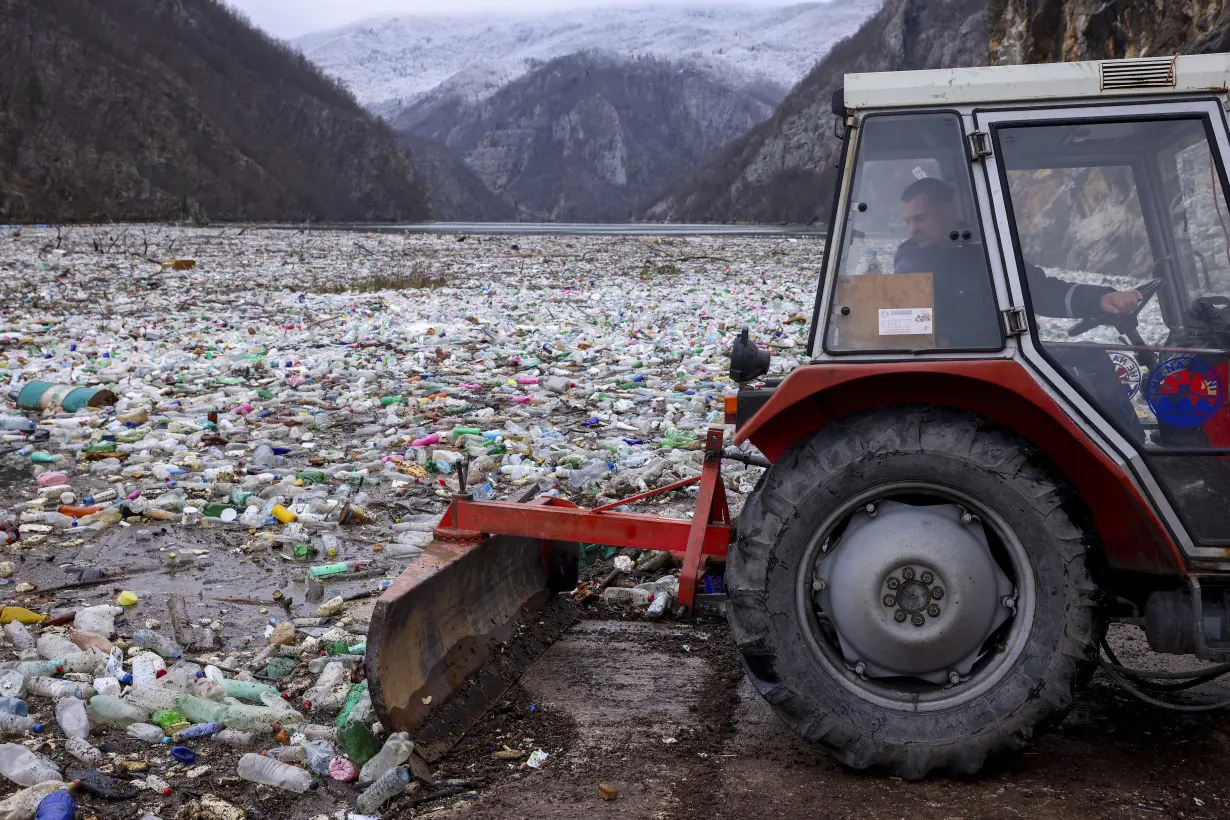VISEGRAD, Bosnia-Herzegovina (AP) — With predictable seasonality, tons of garbage floats down a river at least twice a year and ends up near the eastern Bosnian town of Visegrad behind a barrier installed by a local hydroelectric plant.
An environmental activist watched as workers removed trash from the river.
“New year, new problems or rather old problems with new garbage floating our way,” Dejan Furtula of the environmental group Eko Centar Visegrad said Wednesday.
Garbage from unauthorized waste dumps dotting the Western Balkans is carried year-round by the Drina River and its tributaries in Bosnia, Serbia and Montenegro toward Visegrad, and further on to the Danube River, into which the Drina eventually flows.
But during the wet weather of winter and early spring the waterways in the region swell and sweep up such a huge amount of trash from dozens of illegal landfills along their banks that it can't escape the hold of the river fencing installed by the Bosnian hydroelectric plant a few kilometers upstream from its dam near Visegrad.
As the result, at least twice a year and for a few weeks, the fencing turns into the outer edge of a floating accumulation of plastic bottles, rusty barrels, used tires, household appliances, driftwood, dead animals and other waste, putting into plain sight the failure of regional authorities to adopt and enforce adequate environmental quality standards.
“Once again (since late December), between five and six thousand cubic meters of mixed waste amassed here and the hydroelectric plant workers have been clearing it away,” Furtula said. “Last year, the clearing activities lasted for 11 months, which is to say that the waste keeps coming throughout the year.”
The Drina River runs 346 kilometers (215 miles) from the mountains of northwestern Montenegro through Serbia and Bosnia. The Drina and some of its tributaries are known for their emerald color and breathtaking scenery, and a section along the border between Bosnia and Serbia in particular is popular with river rafters.
However, the regular, headline-grabbing reemergence of the floating waste near Visegrad makes marketing the town as an outdoor tourism destination a very difficult job.
“The ghastly sight that greets Visegrad visitors at the entrance to the town is a problem that we cannot solve,” said Olivera Todorovic from the Visegrad Tourism Board.
“Judging by what we hear from tourists, that ugly and sometimes unpleasantly smelling site discourages many visitors from coming to Visegrad,” she added.
Furtula agreed, but argued that problem was much deeper.
Each year, an estimated 10,000 cubic meters of waste is removed from the section of the Drina near Visegrad and taken to the city’s municipal landfill to be burned. The smoke and leachate from the “always burning” landfill are an obvious health hazard, Furtula said.
In March, Eko Centar Visegrad will start taking water samples from the Drina and testing them for pollutants at several locations, including in the vicinity of the city’s municipal landfill.
“Through air, soil and water, all the released toxins (from the landfill) return to the Drina River and I expect its pollution levels to be really, really high,” Furtula said.
Decades after the devastating 1990s wars that accompanied the breakup of Yugoslavia, the Balkans lag behind the rest of Europe both economically and with regard to environmental protection.
In addition to river pollution, many countries in the Western Balkans have other environmental woes. One of the most pressing is the extremely high level of air pollution affecting a number of cities in the region.
Western Balkans countries have made little progress in building effective, environmentally sound trash disposal systems despite seeking membership in the European Union and adopting some of the 27-member bloc's laws and regulations.
The environmental problem facing Visegrad is “long term and solving it will be neither easy nor cheap,” Todorovic said. “But we must work on solving it.”
Furtula agreed that there were no quick and simple solutions, but said some measures could be easily taken to alleviate the problem.
“All the municipalities upstream from Visegrad should install trash barriers like the one here and establish their own waste collection teams in order to expedite garbage removal, make it more efficient and also to prevent garbage from sinking to the bottom of the river,” he said.



